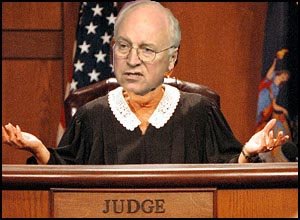Friday, March 24, 2006
Fudging the Numbers
 In perhaps the boldest move of his presidency, George W. Bush appointed his vice president, Dick Cheney, to the Supreme Court, replacing Justice David Souter, whom he kicked off the bench for "the high crime" of sassing Chief Justice John Roberts.
In perhaps the boldest move of his presidency, George W. Bush appointed his vice president, Dick Cheney, to the Supreme Court, replacing Justice David Souter, whom he kicked off the bench for "the high crime" of sassing Chief Justice John Roberts."This is a dream come true. I've always wanted to co-opt the judicial branch," an ecstatic Cheney gushed to the press. His confirmation by the Republican-controlled Senate is expected to sail through. Democratic opposition, while strident, is expected to be ineffectual.
Bush's move was sparked by reports that Souter had "dissed" Roberts as they wrote conflicting opinions on Georgia v Randolph No. 04-1067, which argued the question of police entering a home without a search warrant and over the objections of one of the residents. Souter, writing for the majority, accused Roberts of raising a "red herring" over the question of whether or not requiring the police to obtain a warrant to search for cocaine would impede their ability to protect victims of domestic violence.
"That was low," declared the president. "They hadn't even been talking about fishin', fresh or salt water. In these times of threat to our national security we can't have our justices arguing. They've got to agree. We got to have people who will pull together for America."
Bush discussed the matter with Cheney, and the two began an intensive search for Souter's replacement. After several minutes of what insiders called "agonizing" deliberation, Cheney nominated himself.
Cheney is expected to be confirmed in time for the cases involving the purported "imperialism" of the Executive Branch.



